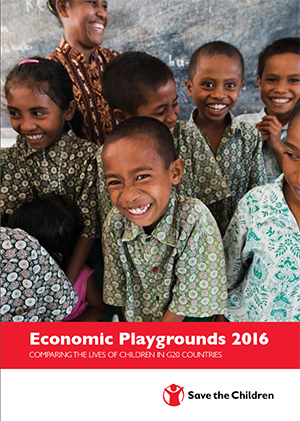Despite World’s Largest Economy, U.S. Ranks Ninth on Child Prosperity; Germany Ranks First
Despite World’s Largest Economy, U.S. Ranks Ninth on Child Prosperity; Germany Ranks First
Although the United States has the world’s largest economy, it ranks ninth among 19 of the world’s wealthiest nations on child wellbeing, according to Save the Children’s newest annual Child Prosperity Index.

Released on July 22 ahead of the G20 Summit in China this September, the index ranks Germany top for the second time running, followed by France and Japan.
In comparing indicators in eight areas affecting child wellbeing across the G20 nations (which also includes the European Union), the United States scores below average on environment, health and gender equality. The U.S. also comes in 10th on safety, largely due to high homicide rates.
The highest the U.S. ranks in any area affecting child wellbeing is in income. However, despite having the highest per capita income, income inequality pulls the U.S. ranking down to fifth.
Likewise, on education, a high U.S. showing on years of schooling was pulled down by the student achievement indicator, where the U.S. is outranked by China, Republic of Korea, Japan, Canada, Germany, Australia, the U.K and France. The index also covers infrastructure and employment.
“The United States may be the most powerful and prosperous nation in the world, but we are far from number one on helping children realize their full potential. Millions of children are paying the price and we must do better,” said Carolyn Miles, president & CEO of Save the Children.
“Investing in early education is key to helping all children succeed in school so they may break the cycle of poverty and contribute to a stronger, safer society for all,” Miles said.
The G20 Summit is a powerful opportunity for the world’s economic and political elite to improve the lives of children in their own nations and across the planet.
Save the Children is asking finance ministers to adopt three guarantees for children worldwide: 1) Make finance fair for the poorest and most excluded families through tax reform and funding education and health services, 2) Make sure the poorest families can participate in and benefit from economic growth and 3) Commit to reducing income inequality while tracking child wellbeing.
“The index also reflects some great advancements in child wellbeing, such as the dramatic increase in school attendance and reductions in child mortality rates in India,” said Carolyn Miles, president and CEO of Save the Children. “But the poorest children in both wealthy and developing nations still face unacceptable risks of preventable death and educational and economic exclusion.”
Source: Save the Children
- 353 reads
Human Rights
Ringing FOWPAL’s Peace Bell for the World:Nobel Peace Prize Laureates’ Visions and Actions

Protecting the World’s Cultural Diversity for a Sustainable Future

The Peace Bell Resonates at the 27th Eurasian Economic Summit

Declaration of World Day of the Power of Hope Endorsed by People in 158 Nations

Puppet Show I International Friendship Day 2020

